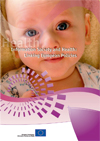 This brochure has been produced by Information Society Policy Link (ISPL), an initiative
of DG Information Society and Media that aims to link information society projects with European policy-makers across a wide range of policy domains.
This brochure has been produced by Information Society Policy Link (ISPL), an initiative
of DG Information Society and Media that aims to link information society projects with European policy-makers across a wide range of policy domains.
More than 3000 projects from information society programmes are being analysed, identifying a wealth of concrete results that support EU policies across all of the principal policy areas. By exchanging information and experiences, the Information Society Policy Link initiative helps to leverage the benefits of these activities for European policies.
For Project Consortia, ISPL can help you to:
- Organise policy workshops and events targeted at the European policy community.
- Make introductions to policy-makers in European institutions and national administrations.
- Make contact with relevant and complementary projects and initiatives funded under other European programmes.
- Identify means to further exploit policy aspects of your results, including through further research, deployment and regulation. For Policy-makers in the EU institutions and Member States, we can help you to:
- Maintain awareness of information society activities relevant to your policy domain.
- Identify promising projects and results within DG Information Society and Mediaâs portfolio.
- Explore ways in which Information Society developments can support the implementation and monitoring of European and national policies.
- Build a dialogue with DG Information Society and Media on future needs and research requirements.
This brochure is one of a series describing projects' policy contributions and achievements
covering around 20 policy areas. A separate series focuses on policy initiatives under i2010, the European Information Society for Growth and Employment. In addition, the initiative organises workshops to stimulate dialogue between researchers and policymakers on key policy issues.
All publications plus information on policy workshops and other news are available via
the ISPL website at:
http://ec.europa.eu/information_society/activities/policy_link/
For further information, please download: Information Society and Health: Linking European Policies Brochure (.pdf, 734 KB)